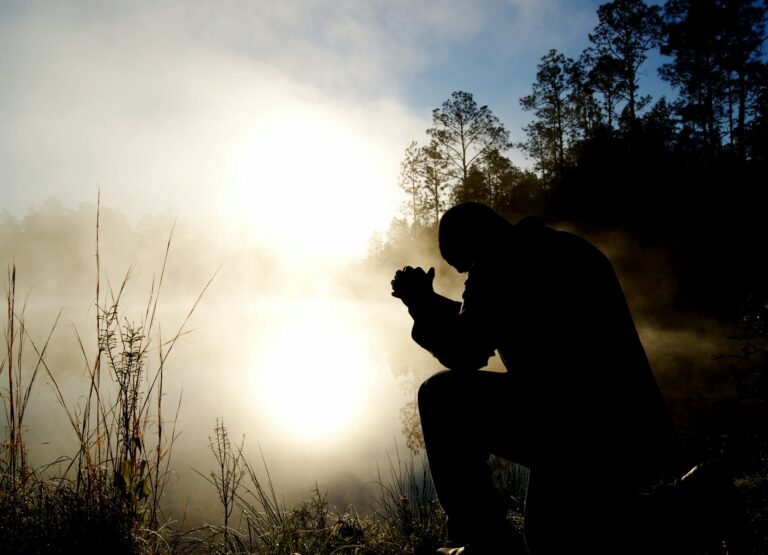If you want to make Christians feel guilty talk to them about prayer. It doesn’t matter what kind of praying you bring up. Christians feel guilty when you bring up private praying, praying in a small group or the most guilt-inducing of all, the church prayer meeting.
Prayer Meeting Guilt
The reason people feel guilty is that they know and you know that they don’t pray as often as they should, or even as often as they know they can.
If you want evidence of this, check out your church’s prayer meeting. When it comes to prayer meeting attendance, I’ve come to have my “10% expectation.” Basically, if 10% of the attendees at your church on Sunday show up to the mid-week prayer meeting, then that is to be expected.
Now your church may be much better than that. You might get 15% or even 25%, but even in the good churches that I know whether large or small, you just don’t get great attendance at the prayer meeting.
So people feel guilty because they don’t go, they feel guilty because they don’t want to go (if they’re honest), and they feel guilty because they haven’t done much to try to pursue a changed desire and a changed calendar.
Is the Prayer Meeting Important?
In order to change both our stubborn wills and our inflexible (and idolatrous?) calendars, we need to see the cash value of the prayer meeting. Is it really more important than we think?
For Paul when he was in prison at Rome, writing to the church at Philippi in Greece, he said, “for I know that through your prayers and the help of the Spirit of Jesus Christ this will turn out for my deliverance” (Phil 1:19). The prayers of other people were important.
But he wasn’t just talking about their private prayers of devotion to God. He was talking about their prayer as a church for Paul and his mission. He was talking about the Philippians’ intercession. Could someone pinpoint God’s help in their lives to the prayers of your church collectively? Could you insert your church’s name in Paul’s sentence: ‘I know that through the prayers of [First Baptist, First Presbyterian or All Souls Anglican, etc]” God is going to act’?
Now maybe the Philippians were praying for Paul individually. But likely they were praying in their service on Sunday morning and together as a church in other settings as well. That’s where we get to the idea of the prayer meeting.
The prayer meeting is important because Paul sees intercessory prayer as an essential tool designed by God for our benefit. With this tool, God brings believers home to heaven.
More Than Get Out of Jail Free
You see Paul is not merely talking about his confidence in being delivered from his Roman imprisonment. His immediate circumstances might have changed, or not. But what he was confident in, what he knew for sure, was his eager expectation that he would be saved. It’s more than a Monopoly card saying “Get of Out of Jail Free.” The term ‘deliverance’ in the original language of Philippians 1:19 is really the term “salvation.” Paul was saved, was being saved, and he knew, he would be saved ultimately. And he saw the prayers of other people being a tool to bring him to his promised glory.
This is why the prayer meeting is so important. When we pray for others God is using our feeble, awkward prayers as multiple threads in the binding cords that are pulling us to heaven. God uses the prayers of others to spiritually assist us in our endurance, our ‘perseverance’ as saints.
Interceding for Your Interceding
Now prayers alone are not sufficient in themselves. This is why Paul adds that it is “through your prayers and the help of the Spirit of Jesus Christ.” Our praying is weak at best. Even when we get together we stumble over our words. It is not the quality of our prayers that makes them effective, but the quality of the Spirit supplied to us. The Spirit of Christ is supplied as help for us. The Spirit proceeding from the Father and the Son is interceding for us (Romans 8:26-27), and the Son is interceding for us (Romans 8:34). Christ by his Spirit is praying for our prayers. So PT Forsyth says:
In this intercession, our best prayer, broken, soiled, and feeble as it is, is caught up and made prayer indeed and power with God. This intercession prays for our very prayer, and atones for the sin in it.[1]
By the Spirit, Jesus intercedes for your interceding.
Jesus atones for your sins and failures in your interceding and Jesus empowers your interceding by his Spirit.
Standing Room Only at the Prayer Meeting?
So are you taking up your privilege and your role to pray for others? Or are you neglecting this access that God uses to prepare people for eternal glory?
Flip it around: Are you asking for the prayers of others? Why waste the potency of prayers in the Spirit, prayers that Jesus intercedes for?
We can be pretty clueless about the supernatural capacities of God, the intercession of Christ, and the help of the Spirit. And we haven’t begun to see how he uses simple Christians and their prayerful love to accomplish his promises. Robert Murray M’Cheyne said:
If I could hear Christ praying for me in the next room, I would not fear a million of enemies.[2]
There’s no need to be ashamed or afraid. If you go to the next prayer meeting at your church, maybe it can be the start of a new discovery, namely God’s glorious supply of his Spirit in Christ.
If people in your church start to discover God’s supply, then prayer meeting attendance will be too big to count.
Picture it: “Standing room only” at the prayer meeting. Picture it, then pray that God would make it so.
[1] PT Forsyth, The Soul of Prayer, CCEL.
[2] Robert Murray McCheyne and Andrew A. Bonar, Memoir and Remains of the Rev. Robert Murray McCheyne (Edinburgh; London: Oliphant Anderson & Ferrier, 1894), 158.
















